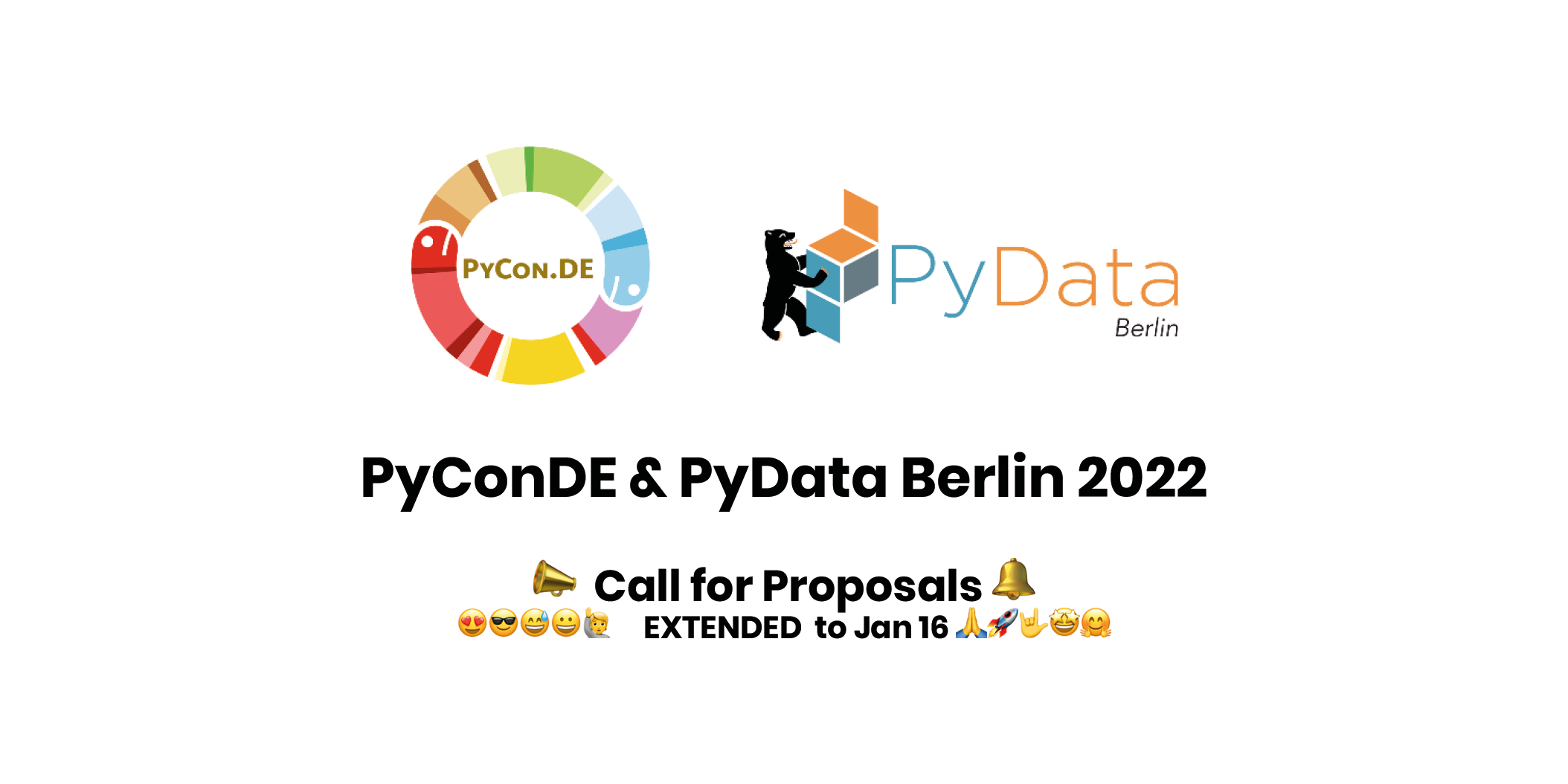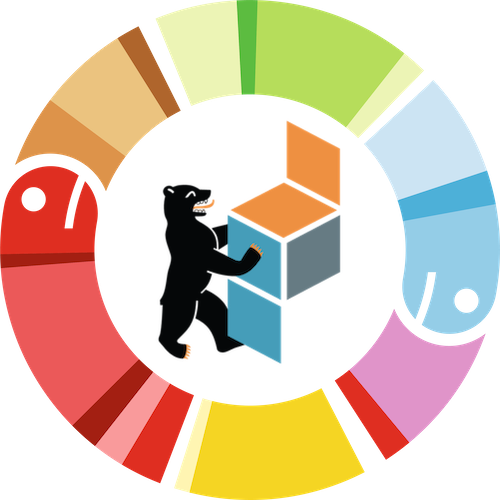PyConDE & PyData Berlin 2022 Call for Proposals
Nov 27, 2021 by Organisers
We're excited to announce that this conference is a joint effort and a collaboration between PyConDE and PyData Berlin, hence there will be dedicated tracks for each area.
Important CfP Dates
- 27 Nov call for speakers open
- 24 Dec call for speakers closes -> EXTENDED UNTIL 16 Jan
- 17 Jan user voting start
- 21 Jan user voting end
- 31 Jan first acceptance notices to speakers (updated)
- 01 Feb publish first batch of accepted talks (updated)
- 09 Feb remaining notices of acceptance or rejection to speakers (updated)
- 19 Feb publish second batch of accepted talks (updated)
Please go to our Pretalx website to submit your proposals. You will need to setup an account there (can be deleted by you anytime), you can edit your proposals until the CfP closes.
Please feel free to forward this call to anyone you think might be interested in submitting a proposal.
PyConDE brings together developers, programmers, DevOps, scientists and others from the Python community to discuss applications techniques, updates to the language, further Open Source development and talk community.
PyData brings together analysts, scientists, developers, engineers, enthusiasts and others from the data science community to discuss applications of new tools and techniques within data science. Our talks often include data management, analytics, visualization as well as new machine learning approaches including statistical and neural network approaches.
Please submit your proposal until
Sunday 16. January 23:59:59 CET
Layout
The conference will feature six tracks, with about 80-100 sessions:
- Two talk tracks dedicated exclusively to PyData topics such as Artificial Intelligence, Machine Learning, and Ethics
- Two talk tracks for Python topics as Programming, Software Engineering, Cloud, DevOps, Web, Django.
- Two tutorial tracks PyData/Python each.
Topics
We welcome presentations focusing on a variety of topics all around Python and Data (incl. languages as R, Julia, Scala and Rust). (See a detailed list of languages and frameworks included, but not limited to the keywords below.) To see the presenatation of previous events, please look at our past conference videos on YouTube at PyData, PyConDE.
Formats
Presentation content can be at a novice, intermediate or advanced level. Talks will run 30-45 minutes and hands-on tutorials will run 90 minutes.
Accepted speakers receive a free ticket to attend the conference. Travel expenses will not be paid; but we do have a diversity travel program and encourage speakers with diverse backgrounds to apply for travel funding.
Your Submission
In our experience, attendees pay close attention to proposal abstracts when deciding which talks to attend during the conference. The submitted abstract will be published as is in the conference program (you can edit the submission later).
We encourage you to include details about the theory and/or practice that you will discuss. Specifically, if the system you've built uses open source tools, please mention the libraries in the proposal and make it clear whether you will be presenting a case-study of their use or if you will discuss details of their design.
In general conference attendees, as well as the review committee, should be able to answer these questions based on your submission:
- What problem is your talk addressing (are you talking about a well known problem or have you found something new during a project)
- Why is the problem relevant to the audience
- What is(are) your solution(s) to the problem, or are you simply pointing out the fact there is an issue we should be aware of (this is also extremely useful)
- What are the main takeaways from your talk. For tutorial submission this is extremely important, please specify what people will have learned at the end of the tutorial session.
You can check out the following submissions from the last year’s conference as a reference for some good examples.
Health Restrictions
In April the conference might still face health restrictions. International travel might be restricted from/to parts of the world. Hence we have included an additional remote option for speakers and attendees starting this year.
Childcare
We are excited to announce that we will offer all-day childcare at the venue. During the conference hours and during the sprints, there will be a dedicated area with childcare professionals who will look after your children. In order to use our childcare services, we ask that you register a separate, free ticket below and let us know everything that is important to keep your child happy during the conference. Please note that places are limited and available on a first-come-first-serve basis. You can register your childcare free ticket here. We look forward to welcoming you and your children to the conference!
Diversity & First-Time Speakers
If you are interested in presenting a talk or tutorial, we encourage your submission(s). We especially encourage first-time speakers and submissions by underrepresented members of the community. Towards that goal we decided to team up with the PyLadies Berlin and organize a mentorship event.
Diversity Travel Sponsorship
As a volunteer-run and non-profit supported conference, we cannot offer travel sponsorship for speakers. However, as part of our diversity program, we do have a limited number of travel scholarships for attendees and speakers. You can learn more about the scholarship on our Diversity Program page, where you can also apply for a scholarship. If you or your company is interested in helping increase diversity at PyConDE & PyData Berlin, we encourage you to reach out at info@pycon.de as we have several sponsorship opportunities available (https://de.pycon.org/sponsors/).
Submission Process
Please go to our Pretalx website to submit your proposals. After you submit a talk proposal, the conference committee will review the proposals and communicate any needed feedback or improvements. We aim to include many first-time speakers, and therefore will attempt to communicate and iteratively help you improve the abstracts.
Keywords:
- Algorithms
- APIs
- Architecture
- Art
- Augmented Reality
- Best Practice
- Backend
- Big Data
- Blockchain
- Business & Start-Ups
- Career & Freelancing
- Cloud
- Coding / Code-Review
- Community
- Computer Vision
- Corporate
- Data Engineering
- Data Mining / Scraping
- Data Strcutures
- Data Visualization
- Databases
- Development Methods
- DevOps
- Distributed (Spark,Dask,…)
- Django
- Diversity & Inclusion
- Ethics (Privacy, Fairness,… )
- Functional Programming
- GIS / Geo-Analytics
- Governance
- Graphs
- Hardware
- Julia
- Jupyter / Notebooks
- Makers & Microcontrollers
- Math
- Natural Language Processing
- Natural Sciences
- Networks
- Neural Networks / Dep Learning
- Packaging
- Parallel Programming / Async
- Performance
- Philosophy
- Predictive Modelling
- Python - CPython new features
- Python - PyPy, Cython, Anaconda
- Python fundamentals
- R
- Reproducibility
- Robotics
- Rust
- Science
- Security
- Simulations
- Social Sciences
- Statistics
- Time Series
- Theory
- Transparency / Interpretability
- 3D Printing
Non-profit
PyConDE and PyData are both volunteer-run conferences. They supports open source development by donating all proceeds to Python Verband e.V. and NumFOCUS, a non-profit organization that supports the development of open-source tools, such as Numpy, IPython, Jupyter, and many others.
Open Source
As a reminder, PyConDE and PyData presentations are intended to share knowledge and experience. To this end, we encourage the code and/or data that your talk relies on to be open-source. Ideally, the audience would have access to the necessary tools to reproduce the results of the talk. Also, we welcome talks focused on your own practical application of tools and concepts either at work or in your free time, but discourage sales oriented proposals whose sole aim is to sell a product.
Conference is under the Code of Conduct
NumFocus
The mission of the US 501(c)3 public charity is to promote sustainable high-level programming languages, open code development, and reproducible scientific research.
Python Software Verband
Is a public charity supporting and furthering the Python language in Germany, Austria, and Switzerland.
Meet and engage with Python developers and enthusiasts at the conference. This conference is an excellent opportunity to present your company, organization and products or services to a friendly and interested audience.
